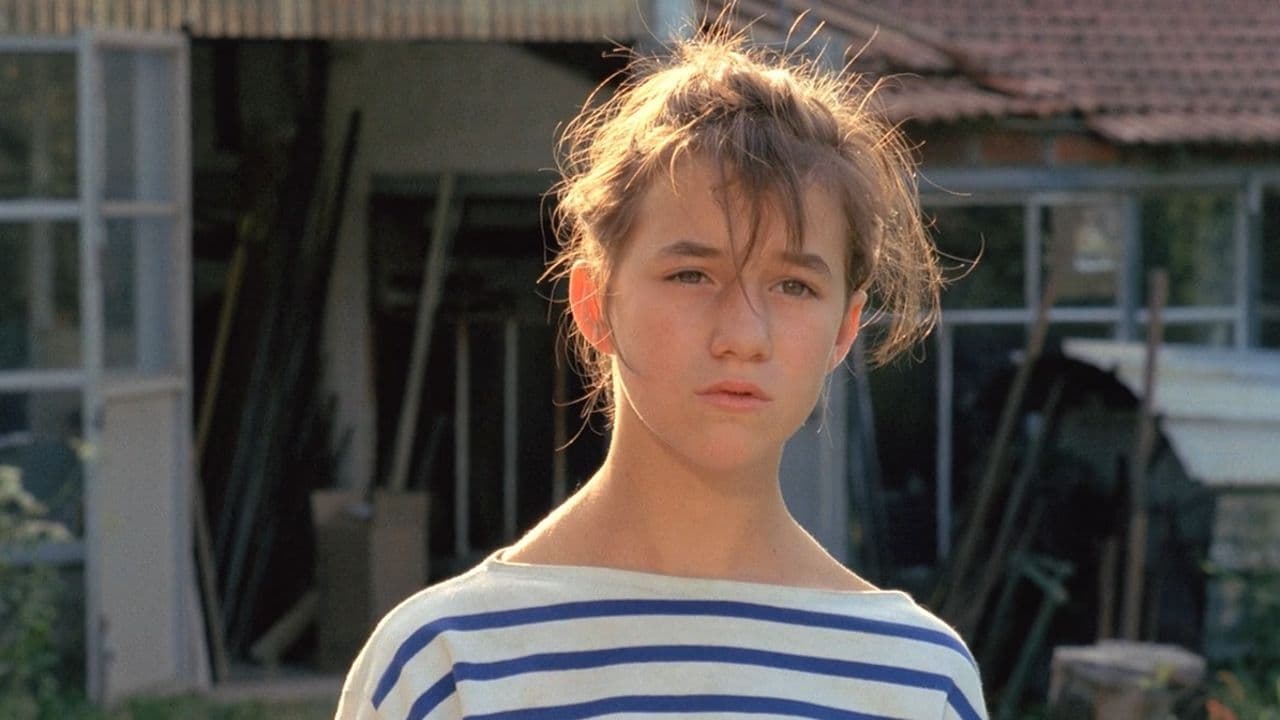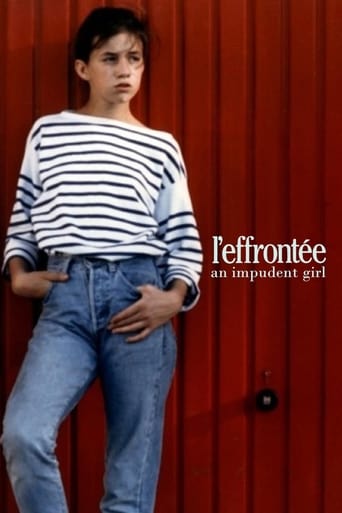

If there's something European film-makers excel at, it's making good, honest movies about being young. In comparison, American efforts in this genre are clumsy, artificial, sanitized, heavy-handed, overly safe and moralizingly preachy to a nauseating degree. In short, American films about youth rush to hit the viewer over the head with a hollow message and throw authenticity, frankness, the life of the soul, and the life of the body into the dumpster. It's as if the characters were intended merely as mouthpieces for ideas or agendas to placate various pressure groups."L'effrontee," however, portrays a vivid sense of place alive with real, breathing people. Raoul Billery is excellent as the widower father, a plain, strong tool-maker; but it is the remarkable Charlotte Gainsbourg who carries the film. She is fabulous as the 13-14 year old girl starting her journey to womanhood without her mother. She articulates the awkwardness, beauty and petulance of this age perfectly, as well as the first self-conscious inklings of her own emerging sex appeal. The strength here is that nothing of real life is artificially filtered out: The movie allows the girl to have the brain, the body, and the emotions to live fully and includes a poignant attraction to a beautiful piano prodigy and the dubious attentions of a significantly older (socially inept?) male. Charlotte Gainsbourg had me miffed at her character and cheering for her at the same time. My heart really went out to her. And man, does she have a trying summer! The only negative in "L'effrontee" is an irritating song that keeps cropping up - sounds like a French attempt to imitate Abba.The film-makers did an excellent job of capturing the look and feel of a sweltering summer. After watching this film, I'd like to see more films made by Claude Miller. And judging from this superlative early performance, I'm eager to see many other films starring Charlotte Gainsbourg.Once you see this movie, you'll cringe when you try to go back to the shallow phoniness of John Hughes, Molly Ringwald or Matthew Broderick. Miss Gainsbourg and "L'effrontee" are the real thing - the cream of the crop.
... View MoreCharlotte Gainsbourg is the main reason to watch this very typical coming-of-age film. She manages to make her character feel human and seem interesting, which is no easy task when she is playing quite a standard insecure teen character. The film does not take the tiresome story of a person wanting to escape their world and change their life to any new level, and it includes some awkward scenes (such as young girl mooning) that add nothing to the story. The film is also weighed down by an overbearing soundtrack of loud and inappropriate songs, but it is by no means a poor film overall. It is decent viewing, and the beautiful child prodigy character played Clothilde Baudon adds some zest, although as already mentioned, the lead performance is the primary reason to see this film.
... View MoreFrançois Truffaut and Jacques Doillon who have often worked with children know well one thing: making a movie about childhood or adolescence is a quite difficult thing. Here, it is Claude Miller's turn to broach the delicate topic of adolescence. The less we can say is that he signed here a sensitive and bitter work that brings out enough strength and emotion to compare with the filmmakers' movies previously quoted.The first indisputable quality that we can put forward is the following one: Claude Miller's film is very far from the clichés generally attributed to teenagers. Charlotte isn't a nymphet, only a teenage girl who is not a happy person and who's searching for love and understanding. The director succeeds very well in making us share his heroine's profound discontentment and Charlotte Gainsbourg won a well-deserved Oscar for her remarkable performance.Apart from the relevant and convincing description of Charlotte, Miller painted a series of characters who are never on the edge of caricature. Lulu is perhaps a naive little girl and the director somewhat made her look ugly by giving her glasses but he does everything to hide her dumb air. Then, Charlotte's father is presented as a good man and faced with her daughter's insolence, he can contain his anger. One last example, Clara's manager is not obsessed with money. With Charlotte Gainsbourg, it would be unfair to neglect the rest of the cast. Either the actors are young or old, they all have a common point: they are all excellent. This only confirm one gift that Claude Miller had already shown in his first movie, the harrowing "la meilleure façon de marcher" (1976): an excellent direction of actors.Besides, like in "la meilleure façon de marcher" (1976), "l'effrontée" (1985) is a perfectly stable movie, both funny, touching and where Miller skilfully alternates moments of tension and calm and the rare moments of violence are only suggested like the scene when Charlotte hits Jean with his globe.Quite obviously, what mainly interested the director in this film is Charlotte's relationship with the most important character of the film: Clara Baumann. Their confrontations constitute the key-moments of the movie. Clara is a talented young pianist and Charlotte blindly idolizes her. She is ready to believe everything she says, even when Clara confides to her that she would like to become her impresario on tour. It is interesting to note down that when she talks about Clara, Claude Miller gently laughs at her naivety. More important, through their relationship, Miller compared their respective worlds. The music used (the song "Sarà, perché ti amo and Mozart) reveal the incompatibility of these worlds and the beginning of the sketched friendship (but is it really friendship?) is eventually bound to fail. To tell this failure, Miller proceeds by little touches: the manager's telephone that doesn't answer, Lulu who creates a scandal during the show. This failure clearly shows Charlotte's disillusion but it doesn't stop the movie to end on a positive tone: when we see the heroine take care of Lulu, she seems to have understood that her place is among her family.The movie also contains another strong point: the relationship between Jean and Charlotte where Miller favors the progressive rise of tension. For this, he uses the same method as Charlotte's failure with Clara: he proceeds by little touches: the movie they watch at the cinema is "the Exorcist" (1973) and the tension gradually grows and explodes when they are in Jean's hotel room.I must admit that I don't know enough Claude Miller's work. I only saw "la meilleure façon de marcher" (1976), "la petite voleuse" (1988) and this one "l'effrontée" (1985) but these three films were sufficient to make me a very good impression of this filmmaker and I am long to discover his other opus.
... View More***SPOILERS*** ***SPOILERS*** ***SPOILERS*** Claude Miller's from the heart film, L'Effrontee is a masterpiece of French film making.SPOILERS AHEAD!!This is the simple story of Charlotte (played with effortless ease and considerable verve by Charlotte Gainsbourg), a girl of thirteen or fourteen who is unhappy with her lot. The school holidays are approaching and she is not going away for a month - not until August. She has nothing to do. She hates her peer group, so doesn't hang with them. She hates the fact that no one at home takes her seriously. Her only friend is Lulu (Julie Glenn), a younger girl with a weak disposition, constantly taking medication to keep her out of hospital, and constantly getting under Charlotte's feet.Charlotte becomes jealous of her brother, who *is* going away on holiday, and Lulu and the housemaid Leone (Bernadette Lafont) bear the brunt of this.There are, however, two new people in Charlotte's life.On one of the last days of school she sees a video of Clara Bauman (Clothilde Baudon), a child prodigy. On the video, Clara is playing Beethoven's Third Piano Concerto. Charlotte finds out that she and Clara are the same age, and that Clara is coming to town to play a concert.It is while watching the video that we see where Charlotte wants to be. We see her inherent understanding of the music and her love for it in the expression on her face. (It is also possible that the love and desire reflected on her face is for the girl.)As the holidays get under way, we see Charlotte out walking with Lulu. A car pulls up behind them and the driver asks if Charlotte knows the way to a place where the other occupant of the car can have her piano stool repaired. The other occupant of the car is none other than Clara Bauman.Charlotte does, indeed, know the way to the metal work factory and shows them the way. Once there, she hangs around and listens carefully to the conversation in an attempt to find out where Clara is staying. She also hears that Jean (Jean-Philippe Ecoffey), a temporary worker at the factory, will deliver the piano stool once it is fixed.Clara and her driver - her manager Sam (Jean-Claude Brialy) - thank Charlotte for showing them the way and depart. But Charlotte has formed her plan: she will hang around and get to know Jean so she can deliver the piano stool with him.In her own clumsy way, Charlotte succeeds in getting to know Jean, and does so seemingly unaware of the dangers of striking up relationships with men ten years her senior.When she gets home, all Charlotte can do is talk about her new pianist friend. This, of course gets on the nerves of Lulu, Leone, and her father - a man who always appears dog-tired.The following day, Charlotte meats up with Jean and they deliver the piano stool to the grand lakeside mansion where Clara is staying. Charlotte manages to get to stay behind once the delivery is made and also succeeds in getting herself invited to a party that night.Once again at home she continues spouting off about her pianist friend, now claiming that she will be joining her on the rest of her tour. In her happiness she sets off a firework in the kitchen, further annoying everyone.As the days to the concert go by, Charlotte becomes increasingly obsessed with Clara. She buys a new dress for the concert. Leone rubbishes the dress, saying it awful and unsuitable, and Charlotte has another of her tantrums. As a result of this she agrees to go to the cinema with Jean. After watching "The Exorcist" they go back to his hotel room. Jean, of course, tries it on with her. She escapes after bashing him over the head with a globe of the world.Meanwhile, because of Charlotte's obsession with Clara, Lulu has become very worried that Charlotte *actually will* leave with her after the concert, so, during the concert, sitting with Charlotte and Leone, Lulu throws a tantrum - right in the middle of the performance - and the trio have to leave the auditorium. Charlotte throws another tantrum and goes to wait backstage for Clara.Clara, however, finishes her performance on a musician's high and completely fails to notice Charlotte. She leaves without her. A distraught Charlotte is seen wandering around outside the concert hall by an overjoyed Lulu, but Lulu's emotions overcome her and she collapses.The final scene is at the hospital where Lulu is recouping. She is on a balcony holding hands with Charlotte, Charlotte finally having realized that what she has got is far better than what she wants.This film very deservedly won several awards:Prix Louis Delluc - Claude Miller;Cesar Awards, France - Best Supporting Acress - Bernadette Lafont;and, of course,Cesar Awards, France - Most Promising Actress - Charlotte Gainsbourg.Go rent it, if only to see where Hollywood so often goes wrong.
... View More